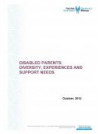The Families Commission developed this resource to share existing knowledge about the needs and experiences of disabled parents and to identify and discuss related issues. We have drawn on selected national and international research literature, strategies and other material, undertaking a literature scan rather than a full review. The scan was supplemented by a small number of consultations carried out with the disability sector, considered alongside findings from other consultations and forums such as those undertaken by the Ministry of Health’s Disability Support Services. Government initiatives aimed at the wider disability community are referred to.
We highlight the support and initiatives that contribute to positive outcomes for disabled parents, their families and whānau. These include recognising parents’ strengths and resiliencies, valuing family and whānau diversity, and allowing parents to identify their changing needs and priorities.
We focus particularly on the following topics:
- Issues and challenges facing disabled parents
- Practices, guidelines and initiatives available to support disabled parents, their families and whānau
- The identification of services and support ‘delivery gaps’
- Barriers to disabled parents accessing particular services and support.
Purpose
The work of the Families Commission focuses on solutions that improve the strength, resilience and wellbeing of New Zealand’s families and whānau.
Participants in our nationwide What Makes Your Family Tick? consultation, (Seth-Purdie et al, 2006) identified a need for improved services and additional support for families with a member who has special learning, physical, or health needs, including addiction problems.
Subsequent contact with the disability sector identified a range of challenges faced by disabled parents. The Families Commission has developed this resource to share existing knowledge about the needs and experiences of disabled parents and to identify and discuss related issues. Drawing on national and international material, the resource focuses on the following topics:
- The challenges disabled parents face (including pre-parenthood)
- The barriers disabled parents face accessing services and support
- Identification of gaps in services and supports for disabled parents
- Practices, guidelines and initiatives for supporting disabled parents and their families and whānau.
The New Zealand Disability Strategy (Minister for Disability Issues, 2001) notes that many disabled people are unable to reach their potential or participate fully in the community because of barriers they face doing things that most New Zealanders take for granted. These barriers include restricted access to facilities, (negative) societal attitudes, and a lack of awareness of disability issues.
Objective 2.3 of the Strategy is to:
- Educate agencies responsible for supporting children and families about the rights and abilities of disabled parents.
Methodology
A brief review of national and international research was undertaken to locate key published papers and reports, particularly those addressing disabled parenting in New Zealand and related topics. This literature scan was supplemented by contact with individuals and agencies at various times from 2007 to 2012.
Those contacted included the Office for Disability Issues (ODI) and their Disability Advisory Council, Work and Income, and Child, Youth and Family (Ministry of Social Development), ACC, the Ministry of Health, the Ministry of Education, the Human Rights Commission, the Health and Disability Commission, the Mental Health Commission, the Ministry of Women’s Affairs, Disabled Person’s Assembly (DPA), IHC, CCS and other disability sector organisations, researchers and academics (in New Zealand, as well the United Kingdom), and Wellington and Christchurch City Councils. The Commission heard from disabled parents who took part in our online polls and panel discussions, and we also held a discussion with members of the Office for Disability Issues’ Disability Advisory Council.
Conceptual models of disability are outlined, alongside consideration of an ecological approach to parenting. We provide an overview of the disability sector in New Zealand presenting key issues drawn from consultations and research literature with knowledge gaps identified.
We outline how disabled parents’ experiences and perspectives are influenced by individual characteristics, experiences, gender roles, culture and ethnicity, as well as the type of impairment they live with.
We explore needs and opportunities for enhancing the support provided with education, housing, and social and recreational opportunities.
We include an overview of the needs of ‘young carers’, including the need to balance their rights with the rights of their parents.
National and international support initiatives and campaigns are identified throughout, with additional resources and links in the appendices.
Key Results
- Disabled parents’ needs for support vary widely, and any support required is likely to change over time.
- Parents should be able to define how much, or how little, support they require.
- Various types of government-funded assistance for disabled parents have emerged at different times and for different purposes, and this has resulted in the fragmented provision of services.
- These gaps in services are a result of the spread of support across a number of agencies, and are not necessarily the most responsive way of meeting individual or family needs.
- In some families, support is only provided when the child of a disabled parent is identified as being ‘at risk’ or when a crisis is reached within the family. Providing early support to disabled parents and their families increases the likelihood that risks and crises can be averted.
- Disabled parents remain a relatively ‘invisible’ group and continue to face attitudinal and other barriers – identifying their needs and preferences will better inform policy and practice.
- Influences affecting the wellbeing of disabled parents and their families and whānau include poverty, low incomes, social isolation, and inadequate professional support .

